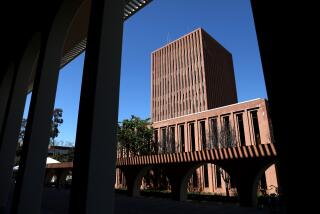Educational Disconnect in Online Learning
- Share via
Since the dawn of the Internet age, boosters have predicted the end of leafy college campuses as schools go virtual. The miracle of the Internet was supposed to let great teachers reach any student, any time, anywhere. People all over the world would get the equivalent of a Harvard degree through a computer and a network connection.
What a crock.
“The people peddling this stuff are suggesting that distance learning offers a bona fide education,” said David
F. Noble, a history professor at York University in Toronto. “But it’s a con job. This is a scam. Distance education is just a digital diploma mill.”
Unlike Noble, I believe that new technologies such as the World Wide Web offer enormous benefits to students. But they work best as an adjunct--not a replacement--to traditional classroom education.
Even tech-heavy institutions such as the Anderson Graduate School of Management at UCLA, where students are required to have a laptop, still consider the classroom the core of the educational experience. Technology helps busy students connect with each other outside of class and gives them access to online resources during lectures.
But attending class solely through a computer isn’t a whole lot better than the correspondence courses developed in the 19th century. And even the major universities that offer correspondence courses won’t give you a degree. It’s the same with computer courses.
“Can you get a University of Chicago degree online? No. Stanford? Columbia? No. They’ll offer you certificates, a degree with an asterisk, just like a correspondence course,” Noble said. “Because they know the difference.”
The difference is obvious to anybody who’s had the luxury of learning in a classroom with a couple of dozen people. Compare that with trying to get a professor’s attention in a cavernous lecture hall surrounded by hundreds of other students. It only gets worse online.
The ability to connect with a knowledgeable instructor on a personal level is largely what distinguishes a great education from a merely adequate one, or even just a rubber-stamped credential for a better-paying job.
Supporters of virtual colleges point to projects such as the Western Governors University as an example of what the future holds. But WGU is a great example of why attempts to develop cyberspace campuses are doomed to failure.
The WGU project sprang out of attempts by 18 western states about five years ago to develop a virtual education system to meet the needs of an expanding college-age population. The public selling point for the WGU was better educations for state residents, but the real motivation for a virtual campus is nearly always purely economic. Lawmakers were desperate to avoid raising taxes to pay for the new campuses to accommodate the kids of baby boomers. Many governors listened to the pitch for the inexpensive, more efficient virtual university and eagerly embraced it.
Well, at least at first.
Eventually, most states came to their senses. Aided by budget surpluses and a booming economy, they made at least some extra investments in traditional educational facilities. California was not involved in WGU but instead set up something that evolved into the California Virtual Campus, which largely offers certificate courses received via TV or the Internet. Today, the WGU has utterly failed to achieve its grandiose plans of building a massive university without walls. It remains active on a low level in Utah, offering a way for highly motivated high-schoolers to get a jump on the college-level curriculum. The Internet can indeed let students “attend” a lecture by a professor on the other side of the world. Such lectures are useful and productive. But anybody who suggests that virtual lectures can completely substitute for a classroom experience is selling something--and it’s not a first-class education.
“I think the face-to-face, person-to-person relationship between student and teacher is irreducible. So it’s hard to imagine simply taking the core act of education and making that happen effectively over the Web today,” said Brian P. Copenhaver, provost of the college of letters and science at UCLA.
Copenhaver said things might change someday with new technologies. He’s a smart guy, but I think he might be overestimating what the technology can do for us. Yeah, at a certain point, it becomes possible for one professor to deliver a lecture over the Internet to a billion students. But how does that one guy answer questions from a billion students? That’s a problem better gizmos are never going to solve.
*
Dave Wilson is The Times’ personal technology columnist.
More to Read
Sign up for Essential California
The most important California stories and recommendations in your inbox every morning.
You may occasionally receive promotional content from the Los Angeles Times.













